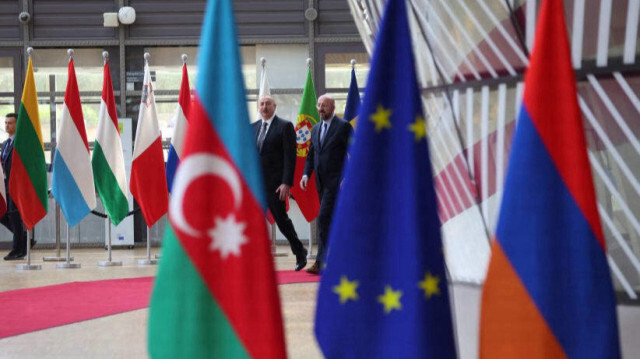
'We strongly object to this decision by the Council of the European Union and expect transparent information about the aid to be provided,' says Azerbaijan's Foreign Ministry
Azerbaijan on Monday criticized the EU's adoption of a military support package for Armenia worth €10 million ($10.8 million) announced earlier in the day, describing it as an "erroneous and dangerous" step.
“Following the steps taken by France to equip Armenia with ‘Bastion' multi-purpose armored vehicles and ‘Caesar' self-propelled artillery systems, the European Union's decision to send military aid to Armenia is an erroneous and dangerous step that serves to increase tension in the region,” Azerbaijan's Foreign Ministry spokesman Aykhan Hajizada said in a statement.
He described the EU's announcement as "unilateral and biased," as well as a "manifestation of the policy of creating 'dividing lines' in the region."
He said the military assistance to Yerevan, as well as future calls for increased support, will help Armenia build up its military.
“We strongly object to this decision by the Council of the European Union and expect transparent information about the aid to be provided,” he went on to say.
He called on the EU to halt such steps, arguing that they “contribute to the policy of military buildup and militarization in the region, and recognize that there is no alternative to peace and cooperation in the region.”
“Otherwise, the European Union will also share responsibility with Armenia for any possible destabilizing provocations,” he warned.
Earlier, the Council of the EU adopted a decision to provide a €10 million assistance package for the Armenian military, which it said aimed to bolster the logistical capacities of the Armenian Armed Forces among other objectives.
Relations between Baku and Yerevan have remained tense since 1991, when the Armenian military occupied Karabakh, a territory internationally recognized as part of Azerbaijan, and seven adjacent regions.
Most of the territory was liberated by Azerbaijan during a 44-day war in the fall of 2020, which ended after a Russian-brokered peace agreement that opened the door to normalization and talks on border demarcation.
Last September, Azerbaijan established full sovereignty in Karabakh following an "anti-terrorist operation" after which separatist forces in the region surrendered.

